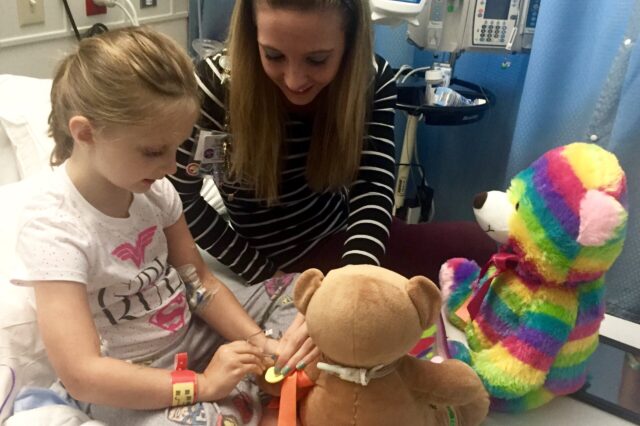Pediatric heart transplant
At UF Health, our multidisciplinary team approach is equipped to handle heart, lung, and heart-lung transplantation procedures for pediatric patients.


Excellent care is at the heart of what we do, that’s why UF Health Shands Children’s Hospital is named as one of the nation’s best pediatric cardiology and heart surgery specialty programs, according to the 2023-24 U.S. News & World Report Rankings.
Children heart conditions
Normally, the heart is very strong and can pump oxygen-rich blood to all parts of the body. When the heart becomes weak and cannot pump enough blood to the body, fluid can back up into the lungs, liver and legs and is reduced to the rest of the body. This known as congestive heart failure. Common heart conditions that can lead to heart failure in children include the following:
Cardiomyopathy
Cardiomyopathy is a weakened or damaged and enlarged heart muscle. Some children are born with healthy hearts that become weak for reasons we do not always understand or they may be caused from a serious viral infection or can run in families (genetic). There are many types of oral and intravenous medications that can be used to treat cardiomyopathy and some children can be treated successfully for many years. However, since there is no cure or surgical treatment for cardiomyopathy, a heart transplant may be necessary if medications no longer treat the condition.
Congenital heart disease
Some children are born with structural malformations of the heart called congenital heart disease (CHD). Most of these heart defects can be surgically repaired and children go on to lead normal lives. There are more serious forms of CHD such as hypoplastic left heart syndrome, tricuspid atresia or other conditions where there is absence of one of the pumping heart chambers. Surgery may be able to reroute the blood flow so the heart can pump blood and oxygen to the body. A heart transplant may be needed if the abnormally formed heart becomes weak in spite of medicines and surgery.
The transplant team will evaluate your child’s heart thoroughly and may offer a different type of surgery or medication regimen to treat his/her condition. We will only recommend a heart transplant if there is no other safe option.
Our transplant programs
Heart transplantation
As Florida’s first pediatric heart transplant program, UF Health Shands Children’s Hospital has been at the forefront of pediatric heart transplantation for more than 25 years. The program’s purpose is to restore the health and quality of life to children suffering from end-stage heart and lung disease.
We performed Florida’s first pediatric heart transplant on October 1, 1986. Then, seven years later, in 1993 we performed the first infant heart transplant in the state of Florida. Other firsts include performing the state’s first pediatric lung transplant in 1996, the first pediatric heart/kidney transplant in 1994, the first pediatric heart/lung transplant in 1999, and the first use of the Berlin VAD in 2006. As of June 2018, we have performed 265 pediatric heart transplants, making us one of the highest volume centers in Florida.
By the end of 2019, we performed 272 pediatric heart transplants, making us one of the highest volume centers in Florida.
The pediatric heart transplant program at UF Health Shands Children’s Hospital evaluates infants, children and adolescents with end-stage heart disease who are potential candidates for heart transplantation. We are the transplant referral center for the most complex patients in and around the state of Florida. Our pediatric cardiologists and congenital heart surgeons have pioneered heart transplantation in high risk patients who are not offered transplantation at other centers. The majority of our referrals are for patients with complex congenital heart disease with the remainder done in patients with cardiomyopathy who have failed maximal medical therapy.
Pediatric heart transplantation is safe and can even be performed on infants with otherwise lethal cardiac conditions. Most patients are able to recover and return to society in a productive manner.
Congenital heart defects that could be considered for transplantation include:
- Hypoplastic left heart syndrome
- Single ventricle with hypoplasia of the aortic outflow tract
- Atrioventricular canal defect
- Truncus arteriosus
Hypoplastic left heart syndrome accounts for one to two percent of all congenital heart disease and is the most common cause of death from a cardiac defect during the first month of life. These infants can benefit from an infant heart transplant program.
Transplantation is the only treatment that offers hope to infants with irreversible cardiomyopathies. Currently, the indication for the vast majority of pediatric heart recipients over the age of one year is cardiomyopathy.
Infant transplant patients are evaluated in the neonatal intensive care unit or pediatric intensive care unit at UF Health Shands Hospital. Once accepted for transplantation, the infant remains at UF Health Shands Hospital until transplantation. Infants are at significant risk of rejection, infection and developing accelerated coronary artery disease after heart transplantation.
Infants receive endomyocardial biopsies at regular intervals to check for rejection. Older children and adults receive endomyocardial biopsies more frequently than infants.
Families must stay within one hour's driving distance from the hospital for the first two to four months following transplantation due to the frequency and complexity of outpatient visits. Transplant housing is available for families who live more than one hour from UF Health Shands Hospital.
Lung and heart-lung transplantation
The UF Health Pediatric Lung Transplant Program is the only one of its kind in Florida and consists of one cardiothoracic surgeon, one thoracic surgeon, one pulmonologist and four nurse practitioners.
At UF Health, we offer unique medical approaches, such as lung reduction surgery, to treat children with life-threatening lung disease. Our mission is simple: to enhance each patient’s quality of life through compassionate care, access to state-of-the-art medical treatment and ongoing research studies at UF Health.
In 2013, the UF pediatric lung transplant team performed the first heart-lung transplant in a child under the age of two in the state of Florida.
Our outcomes
Our multidisciplinary team approach, experience, expertise, and ongoing commitment to innovation and compassionate care have set the standard of care for children with end-stage heart failure achieving excellent long-term survival rates. In the July 2021 report, the Scientific Registry of Transplant Recipients measured the percentage of patients who have survived transplant for one month, one year and three years. At our center, of the 35 patients transplanted between Jan. 1, 2018 and June 30, 2020, 94% survived one month and 90% survived one year. In addition, of the 36 patients transplanted between July 1, 2015 and Dec. 30, 2017, 86.11% survived three years
View our program outcomes from the SRTR website, as last reported in July 2021.
Questions, appointments and referrals
Please reach out to our team with your questions and for more information. We have a comprehensive pre-transplant manual that will provide you more information, which you will receive prior to your first appointment. If your child goes on to have a heart transplant, a post-transplant manual will be provided and one of our transplant coordinators will provide the education and supplies that you need to care for your child at home.
UF Health Shands Children's Hospital Pediatric Heart and Lung Transplant Program
1600 Southwest Archer Road
CHC PO Box 100233
Gainesville, FL 32610-0223
Telephone: (866) 690-0665
Telephone: (352) 265-0665
Fax: (352) 265-0057
Community and Patient Programs: Pediatric heart transplant
Our community and patient programs provide great value to patients, families and loved ones. People can find support, educational materials, expert consultants and more. In most instances, these programs are offered free of charge.
-
Music in the Clinical Setting
Offers a wide variety of music-based therapies from in-room performances to collaborative recording sessions.
-
Pediatric Social Workers
Offer counseling, planning and other assistance to all pediatric patients.
News and Patient Stories: Pediatric heart transplant
Caring for Those with Congenital Heart Disease
Congenital heart defects, better known as abnormalities of the heart, remain the most prevalent type of birth defect, affecting one in every 133 people. This…

Children’s Miracle Network Hospitals at UF Health Shands Children’s Hospital reaches $100 million fundraising milestone
April 16, 2019
Children’s Miracle Network Hospitals, or CMN Hospitals, at UF Health Shands Children’s Hospital has reached a significant milestone in the organization’s…
Department of Community Health and Family Medicine, Department of Pediatrics, Department of Surgery, +5 more
